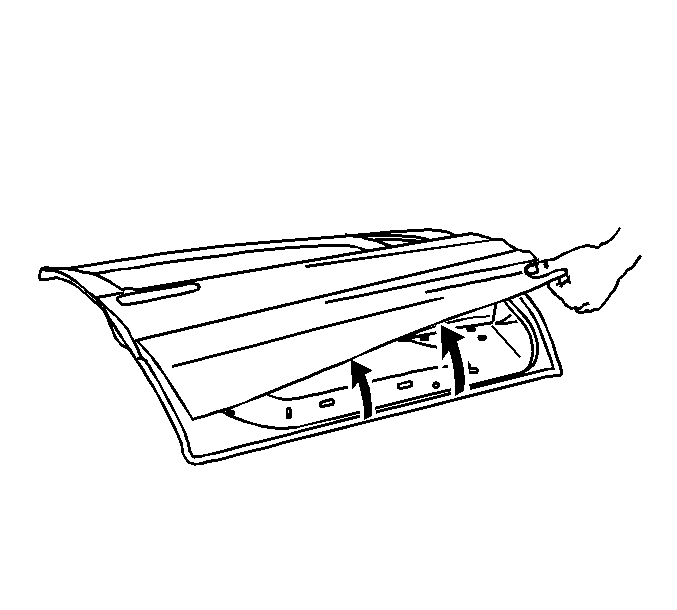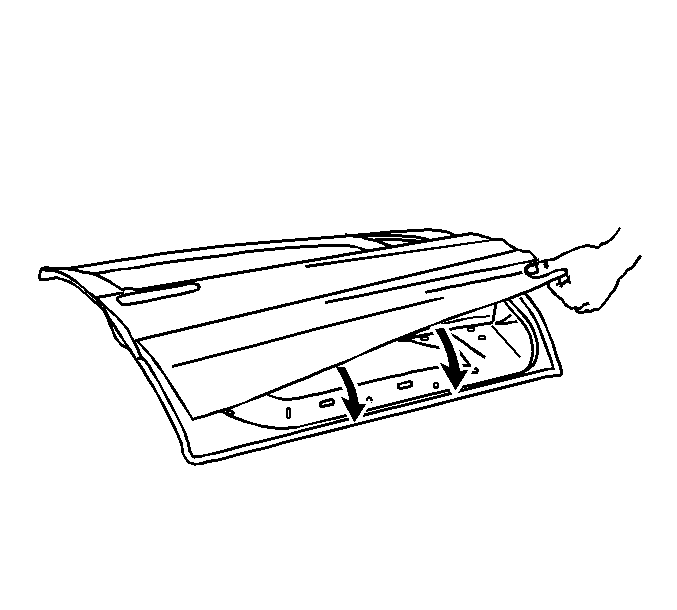Removal Procedure
- Disable the supplemental inflatable restraint (SIR) system. Refer to SIR Disabling and Enabling in SIR.
- Disconnect the negative battery cable. Refer to Battery Negative Cable Disconnection and Connection in Engine Electrical.
- Remove all related panels and components.
- Repair as much of the damage as possible to factory specifications. Refer to Dimensions - Body .
- Remove the door assembly. Refer to Front Side Door Replacement in Doors.
- Locate and drill out all factory welds.
- Grind the edges of the door outer panel to separate the outer door panel from the door shell.
- Remove the outer door panel.
- Remove the sealers and anti-corrosion materials from the repair area, as necessary. Refer to Anti-Corrosion Treatment and Repair in Paint/Coatings.
- Straighten the edges of the door shell.
Caution: Refer to Approved Equipment for Collision Repair Caution in the Preface section.
Important: Before beginning the repair, refer to Metal Panel Bonding for proper adhesive applicator preparations and general information.



Caution: Inspection of the door guard beam for damage must be performed before replacement of the door outer panel. If damage to the door guard beam is found the door must be replaced. Failure to do so may compromise the structural integrity of the vehicle and may cause personal injury if the vehicle is involved in a collision.

Installation Procedure
- Using a grinding disk grind the surface of the door shell, mating the flanges to bare steel.
- Scuff the opposing mating surfaces of the door outer panel to remove the gloss of the E-Coat.
- Drill 8-mm (5/16-in) plug weld holes as necessary in the locations noted from the original panel.
- Clean the mating surfaces.
- Apply a 3-6 mm (1/8-1/4 in) bead of metal panel bonding adhesive GM P/N 12378566/7 (Canadian P/N 88901674/5) or equivalent, to both of the mating surfaces.
- Using a small acid brush, spread a coat of adhesive to cover all the bare metal surfaces to ensure corrosion protection.
- Install the door outer panel to the door shell.
- Clamp the door outer panel into position as required.
- Using a hammer re-hem the hem flanges around the door shell .
- Using lacquer thinner remove the excess adhesive from the door panel area.
- Install the door to the vehicle. Inspect the door outer panel for proper alignment, adjust the alignment as required.
- Using metal-inert gas (MIG), weld the door outer panel to the door frame in the locations noted at the upper door frame.
- Clean and prepare all welded surfaces.
- Apply Fusor super flexible anti-flutter foam-fast set, Fusor P/N 121/124 or equivalent in 4-5 evenly spaced locations between the door outer panel and the inner safety beam.
- Apply sealers and anti-corrosion materials to the repair area as necessary. Refer to Anti-Corrosion Treatment and Repair in Paint/Coatings.
- Paint the repaired area. Refer to Basecoat/Clearcoat Paint Systems in Paint/Coatings.
- Install the door assembly. Refer to Front Side Door Replacement in Doors.
- Install all related panels and components.
- Connect the negative battery cable. Refer to Battery Negative Cable Disconnection and Connection in Engine Electrical.
- Enable the SIR system. Refer to SIR Disabling and Enabling .



Important: In any area damaged beyond recognition, space plug weld holes every 40 mm (1 in) apart.

Important: The adhesive has a 40-50 minute working time. Do not allow the door to totally cure off the vehicle, as proper alignment of the door outer panel to the door shell will be difficult.

Important: Do NOT pull the panels apart after being joined together. Slide the panels against each other to realign the panels.

Continue to hammer in stages along the hem flanges.


